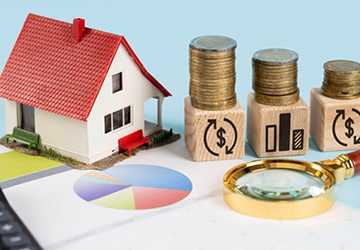Are you planning to buy a property? It's good that you're taking this step, but you must first weigh the chances of making a profit. Considering rental income, fees, neighbourhood trends, and property conditions will help you confidently decide to maximize your return. In this article, we'll show you four main ways to value a property and determine whether it will be profitable or a financial disaster.

Expert tips for evaluating investment opportunities
When you think about investing in properties, you want to make sure they make money. Here are four simple tips to help you determine if a property is worth your money:
Calculate potential revenue
First, find out what rental prices are for properties in the area. You can check out what's available online, talk to local real estate agents, or even see ads in the newspaper. Once you know what other homes nearby are renting at similar rates, you can estimate how much you could get for your investment property.
Next, it makes sense to look at vacancy rates. In this case, your property will remain vacant during your occupancy. In a booming real estate market, vacancies are not going away. Therefore, you must be prepared to include this factor in your calculations. General rules of thumb include subsidizing around 5-10% for vacancy rates.
Consider the cost
Not only do you have your expenses, but you also have to consider the various costs of being a landlord. For example, property taxes, insurance, maintenance and repair costs, fees (if you hire a management company), and utilities for which you are responsible.
Property taxes and insurance are usually straightforward since they are mailed once or twice a year. Maintenance costs can vary significantly depending on the age and condition of the property. Therefore, you should save some of your monthly rental income for repairs.
Additionally, planning for unexpected situations like water leaks and broken appliances is a good idea. Thousands of landlords save a small portion of their monthly rental income to cover various emergencies.
Calculate cash flow
Once you're happy with your property's projected income and expenses, it's time to calculate whether you can make a profit. First, costs are subtracted from rental income to calculate net operating income (NOI).
NOI represents the difference between the amount you have left after paying all your monthly expenses; this is the cash you might use to pay off your mortgage (if you have one). But it can also be used to pay for a down payment on a home, set aside savings for repairs or investments, or as profit.
Check return on investment (ROI)
Now, it's time to make a final assessment of your overall return on investment. Here, you need to calculate your annual NOI and divide it by your total investment in the property. The result is the ROI expressed as a percentage.
If your annual NOI is $10,000 and you invest $100,000, your return on investment is 10%. Therefore, the yearly rate of return on this investment is ten per cent.
A high ROI is usually good because you get much for your money. Return on investment is essential in real estate valuation, but other factors must be considered when analyzing a property.
Evaluate the neighborhood
The location of a property affects its potential return. Make sure you spend at least a few minutes exploring the area where the hotel is located. Look for evidence of growth and development, such as growing companies, infrastructure improvements, and job openings. Homes in neighbourhoods with high and rising rental demand are likelier to have higher values and reliable tenants.

Also, note that neighbourhoods are experiencing decreased value or increased crime. Renting these areas can be more complex and require regular maintenance and repairs, reducing your income.
Assess property condition
Before investing, inspecting the property thoroughly to understand its features is necessary. Look for damaged structures, leaks, or pests that could cause the bag to leak. It is recommended that an expert inspect the home and obtain a home defect report before making a final decision.
Additionally, consider the age and condition of major equipment, including HVAC systems, pipes, and electrical wiring. Buildings needing better maintenance or updating may experience breakdowns or scheduled repairs. Therefore, allocate part of your budget to these expenses.
Also, consider the overall appeal of the property. Well-managed properties give tenants reason to believe they live somewhere with a high standard of living, so demand for them will be high, leading to higher rental prices and improved profitability.
Conclusion
A closer examination of investment properties as a source of income requires a detailed analysis of several elements. Many factors must be considered, including calculating potential rental income and expenses, assessing neighbourhood and property conditions, and more.
Every step of the process is critical to making informed investment decisions. These steps will enable you to face the real estate market boldly and recognize the opportunities that can bring you and your financial interests high profits. Happy investing!



